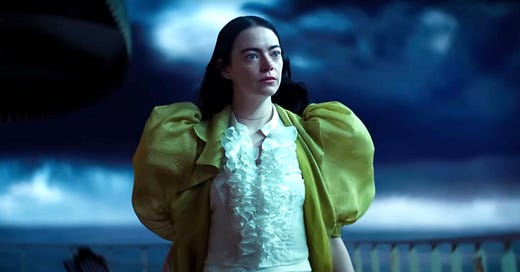Poor Things
Emma Stone plays a created woman who lusts to experience all that life has to offer in this twisted feminist Frankenstein tale from director Yorgos Lanthimos.
Going in to see “Poor Things” I heard much raving about shocking it is and how good it is. It is indeed both of those things, though not nearly so much in either regard as we’ve been led to believe.
Emma Stone plays Bella Baxter, a woman created by a scientist as a Frankenstein-like experiment. Growing from a childlike state in an adult body, she develops an insatiable craving to experience all that life has to offer, and embarks on a European spree of sex and discovery that leads her to a sense of realization about the depraved nature of mankind… emphasis on the man.
All the men she encounters are some degree of shitty and seek to use her to their own ends, though some are more forthright about it. A few, the better ones, at least grow to be self-aware and regretful.
It’s essentially a feminist Frankenstein tale — though one, it should be said, sprung forth from an entirely male creative team. Screenwriter Tony McNamara adapted Alasdair Gray’s novel, and it was wrung through the twisted, dream-like vision of director Yorgos Lanthimos. His off-putting, existential broodings (“The Lobster,” “The Killing of a Sacred Deer”) are beloved by many, but not me.
Stone played for him in “The Favourite,” which is as a close to a straight narrative as Lanthimos has made (earning them both Oscar nominations). “Poor Things” is the director’s style boiled down to its inky essence. He shoots with fish-eye lens, silent movie-era irises and other camera tricks (cinematography by Robbie Ryan) that give the film a deliberately heightened, distorted feel.
This is underscored by the eerie, atonal music by Jerskin Fendrix — imagine a calliope played in solitary notes underwater — and production design (by Shona Heath and James Price) that depicts the 19th century setting as somewhere between Victorian futuristic optimism and dour, mechanical Marxist disdain.
Mix the German Expressionism of “The Cabinet of Dr. Caligari” with Wes Anderson’s hipster diorama fetish, and you’ve got a pretty good idea of the look-and-feel of “Poor Things.” It’s never not interesting, but I get the sense the aesthetic is more about servicing Lanthimos’ own craving for the bizarre than serving the story.
The plot: Bella wanders like a toddler about the London mansion of Godwin Baxter, a brilliant and disfigured surgeon played by Willem Dafoe in sure-to-be-Oscar-nominated makeup that renders his face a fascinating puzzle. Without giving away too much, Baxter reanimated Bella’s dead body, but not before some depraved tinkering, and is now raising her to mental maturity as his surrogate daughter. She alternates between calling him “God” and “Dad.”
At first Bella can barely walk and talk, and smashes dishes or pees on the floor like a lovely enfant terrible. Baxter employs one of his students, Max McCandles (Ramy Youssef), to study her development. She soon reaches the stage of sexual awakening, Baxter tries to steer her urges toward the chivalrous Max, and the two are betrothed.
She is then more or less kidnapped by Duncan Wedderburn, a scheming fop and lawyer played by Mark Ruffalo. They live the high life in several continental locales, and Duncan takes it upon himself to school Bella in the ways of lovemaking, having dubbed himself one of its masters.
Perpetually inquisitive and lacking any sense of societal propriety — “the polites,” as she refers to it in her disjointed speech — Bella expands her education beyond Duncan’s purview, which vexes him to no end and marks the countdown until they part ways. Bella finds her own employment in one of the hoariest of professions, which leads her to learning about the world and its denizens at a much quicker, and more disparaging, rate.
A lot of attention will be focused on all the sex and nudity in the film, so let’s go ahead and talk about that.
There is quite a lot of it, as the primary driver of Bella’s thirst for experience is of the carnal sort. Bella was born with no concept of modesty or restraint, so Stone shows none in displaying her body. Lanthimos is no Paul Verhoeven (“Basic Instinct,” “Showgirls”), leering his camera across his actress’ body with unabashed lasciviousness. But there are many frank (and funny) montages of sexual rutting, or “furious jumping” in Bella’s idiom.
The central theme of the film is female sexuality, and how men exploit it when it pleases them and seek to quash it mercilessly when it threatens them. Ruffalo’s Duncan Wedderburn — Bella always uses his whole name when speaking to or about him — thinks of himself as a boundary-jumping rapscallion, but when Bella’s appetites outstrip his own it leaves him completely unmanned.
It’s a brave and bold performance by Stone, and one it must be said few mainstream actresses of her generation would be willing to embrace. Bella starts out as a very selfish and unlikable character, and manages to grow into a more complete human being without ever losing her sharp, intrinsic sense of independence. Stone has given us something both instantly iconic and truly mold-breaking.
The movie stumbles and shambles in the last act, introducing a last-minute villain, the militaristic Alfie Blessington (Christopher Abbott), who personifies all the Y-chromosome small-mindedness and wickedness in one pretty package. It feels like the filmmakers shouting, and doesn’t register on any kind of emotional level.
The whole thing could easily have been written out of the movie, and probably should have.
I will be genuinely curious to see what the reception to “Poor Things” is. I found a lot about it to admire, mixed in with some great silliness and a profound sense of self-regard for its own preciousness. Like Bella it is flawed, but never mundane.





